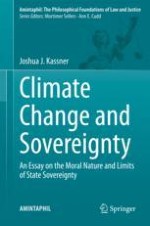This book offers a meditation on global justice and international political and legal theory. The author assesses positions in the current debate over the moral nature and limits of sovereignty. He also evaluates the normative role sovereignty ought to play in the practical deliberations of states.
The discussion moves from theory to practice. Coverage starts with a conceptual analysis and moral critique. It then goes on to consider specific issues. These include global climate change, secession and self-determination, human rights, global distributive justice, and immigration. Readers will learn how states ought to deliberate about and respond to these important topics. They will also discover potential institutional structures better suited to resolving these issues while also respecting state sovereignty.
In working through each specific challenge, the author provides insight into how we ought to think about challenges facing the international community and the potential for properly constructed institutions to function as solutions. These analyses also provide a valuable critical lens to assess the actions (and omissions) of our leaders.
In the end, the book argues that domestic governments and regional bodies should be responsible for implementing the chosen course of action. This would provide a basis for holding political leaders more accountable.
